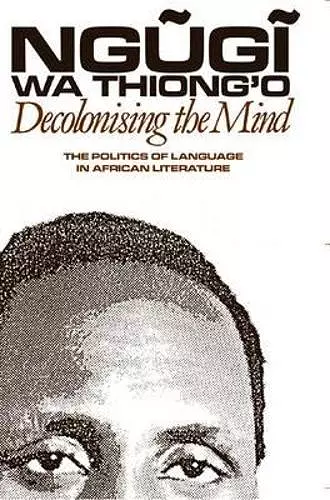Decolonising the Mind
The Politics of Language in African Literature
Format:Paperback
Publisher:James Currey
Published:26th Jun '86
Should be back in stock very soon

A collection of essays about language and its constructive role in national culture, history, and identity, that advocates for linguistic decolonization. 'The language of literature', Ngũgĩ writes, 'cannot be discussed meaningfully outside the context of those social forces which have made it both an issue demanding our attention, and a problem calling for a resolution.' First published in 1986, Decolonising the Mind is one of Ngũgĩ's best-known and most-cited non-fiction publications, helping to cement him as a pre-eminent voice theorizing the 'language debate' in postcolonial studies. Ngũgĩ wrote his first novels and plays in English but was determined, even before his detention without trial in 1978, to move to writing in Gikuyu. He describes the book as 'a summary of some of the issues in which I have been passionately involved for the last twenty years of my practice in fiction, theatre, criticism, and in teaching of literature...'. Split into four essays - 'The Language of African Literature', 'The Language of African Theatre', 'The Language of African Fiction', and 'The Quest for Relevance' - the book offers an anti-imperialist perspective on the destiny of Africa and the role of languages in combatting and perpetrating imperialism and neo-colonialism in African nations. East Africa [Kenya, Tanzania, Uganda and Rwanda]: EAEP
Many of the ideas are familiar from Ngugi's earlier critical books, and earlier lectures, elsewhere. But the material here has a new context and the ideas a new focus. This leading African writer presents the arguments for using African language and forms after successfully using an African language himself. - -- Anne Walmsley * THE GUARDIAN *
... after 25 years of independence, there is beginning to emerge a generation of writers for whom colonialism is a matter of history and not of direct personal experience. In retrospect that literature characterised by Ngugi as Afro-European - the literature written by Africans in European languages - will come to be seen as part and parcel of the uneasy period between colonialism and full independence, a period equally reflected in the continent's political instability as it attempts to find its feet. Ngugi's importance - and that of this book - lies in the courage with which he has confronted this most urgent of issues. - -- Adewale Maja-Pearce * THE NEW STATESMAN *
Ngũgĩ's is a many splendored book. It is the personal testimony of an author who has fought a long battle of his own to undo the colonization of his mind. At the same time the book presents a historical analysis of subversion of personal identities and cultures of the colonized peoples in the process of colonization. It is also a book on the historical development of orature and literature in Africa. Finally, it is an essay in literary theory and criticism on the role of the artist in society. Ngũgĩ writes about Africa, his analysis applies to all of the Third World. -- African Studies Review
ISBN: 9780852555019
Dimensions: unknown
Weight: 174g
128 pages